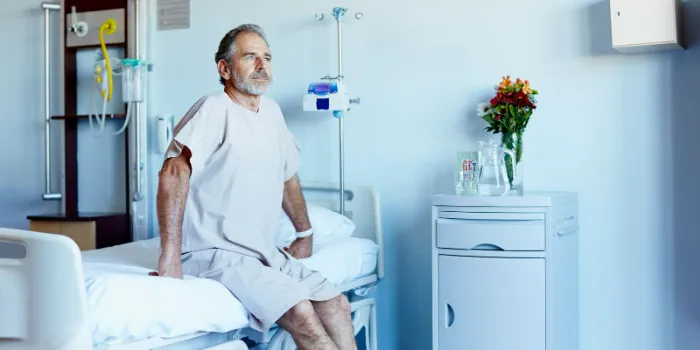Thrive
Tips to help your recovery after surgery
If you’re waiting for surgery, you could use this time to plan for your recovery. Steps you take now can have an impact on how well you recover. Below are some ways you can prepare, and I provide tips to help you return to your regular routine as soon as possible.

How long does it take to recover from surgery?
The length of time it takes you to recover from your procedure depends on different things. For example, your overall health before surgery and the type of operation you’ve had.
If your operation can be performed using ‘keyhole’ surgery, this could help you recover more quickly. This is because during keyhole surgery, your surgeon can make smaller cuts (incisions) in your skin to access the area that needs treatment. This can help to reduce pain after your operation. And your recovery and stay in hospital afterwards may also be shorter.
Your surgical team will be able to advise how long your recovery may take.
What helps you heal faster after surgery?
Healing after surgery takes time. But, making sure you stay healthy before your operation can make a big difference to its success and your recovery. By making healthier lifestyle changes now, you can also help to improve your overall wellbeing.
Below are some steps you can take now that can help your healing afterwards.
1. Stop smoking
There are lots of reasons to stop smoking, but preparing for an operation is another important reason. If you smoke, you’re at greater risk of lung and heart complications, infection, and you’re more likely to need to stay in hospital longer. Smoking can also affect wound healing so this could delay your recovery.
2. Eat a balanced diet
Eating a healthy diet full of vitamins and minerals can help prepare your body for surgery. And it can help your body repair itself afterwards.
3. Maintain a healthy weight
If you’re overweight, you’re more at risk of complications. Losing excess weight safely before your operation can help to reduce these risks. And, can reduce your risk of other health problems in future.
4. Limit alcohol
Avoid excess alcohol before your operation. It can affect your body’s ability to heal, which is important for recovery. If you’re a heavy drinker, you’re more at risk of complications after an operation. You shouldn’t drink more than 14 units of alcohol a week. If you’re drinking more than that, think about cutting down your drinking.
5. Improve your fitness
If possible, it’s important to keep active before your surgery. Research suggests that the fitter you are, the better your body is able to cope with surgery. Any activity that gets you out of breath will help. You could try brisk walking or cycling, or take the stairs instead of the lift.
6. Look after your mental health
It’s important to look after your mental wellbeing during this time, especially if your operation has been delayed. Studies have found that stress can also delay wound healing. Relaxing breathing techniques and mindfulness can help you feel calmer, as can taking time to do things you enjoy like reading and listening to music.
You can also watch our video on preparing for surgery for more information.
How will I feel after my surgery?
After your operation, you’re likely to feel tired and you might have some pain or discomfort. You’ll be offered some pain medication to help with this.
Before you leave hospital, you’ll be given information about your recovery at home. This will cover how to manage any pain, how to look after surgical wounds, and anything you need to avoid after your surgery. If there’s anything you’re unsure about, just ask.
What arrangements should I make before my surgery?
While you’re waiting for your operation, take some time to think about any practical arrangements you need to make. These might include the following.
- Arrange for someone to drive you to and from hospital. It’s usually advised that someone stays with you for the first 24 hours after your operation if you’ve had a general anaesthetic.
- Ask someone to take on any caring duties while you’re unable to – this might include childcare, looking after elderly relatives or pets.
- Speak to your employer about time off work.
- Stock up your food cupboards and prepare freezer meals to make things easier when you’re at home.
- You might want to move your favourite chair to a more convenient place, or set up a bed downstairs if you’re going to be less mobile after your surgery.
You should also pack a bag to take with you. You may be given a list to help with this. It’s usually a good idea to pack:
- any regular medication
- toiletries
- nightwear
- comfortable clothes and slippers
You might also want to pack something to help you pass the time such as books, magazines, or playing cards.
How long will it take to get back to normal after surgery
How long it takes to return to normal after your operation depends on lots of things because everyone is different. Your doctor can give you an idea of how long it might take for you to resume your usual activities.
You might want to ask your doctor about the following.
- Getting back to daily activities and exercise. Your doctor will advise about any activities to avoid after your surgery. In general, it’s good to build up activity gradually. Ask your doctor about specific activities or sports that you want to get back to.
- Driving. Unless you have been advised otherwise, it’s usually OK to drive again once you feel you’re able to safely. But there are rules about when you can drive again after some surgical procedures. Ask your doctor, and check with the Driver & Vehicle Licensing Agency (DVLA).
- Returning to work. You’ll probably need some time at home to recover after your operation. Talk to your doctor about how long this might be. This will depend on the surgery you have and the type of job you do. You may feel worried about going back to work but getting back into a routine can help your recovery and prevent you feeling isolated.
You might also find it useful to keep a diary of your recovery, setting yourself some daily goals for encouragement. Depending on what surgery you had, it could take many weeks to feel fully recovered and back to normal. Your body needs time to heal properly. So, try to be patient with yourself during this time.
Health insurance gives you choice and flexibility when it comes to receiving treatment for an acute condition. Learn more about our private health insurance and the benefits.
-
Sources Sources
- Laparoscopic surgery – what is it? American Society of Colon & Rectal Surgeons. Fascrs.org. Accessed August 2023
- Walshaw J, Huo B, McClean A, Gajos S, Kwan JY, Tomlinson J, Biyani CS, Dimashki S, Chetter I, Yiasemidou M. Innovation in gastrointestinal surgery: the evolution of minimally invasive surgery-a narrative review. Front Surg. 2023 May 23;10:1193486. doi: 10.3389/fsurg.2023.1193486
- Joint briefing: Smoking and surgery. ASH action on smoking and health. Ash.org.uk. Published April 2016
- Gillis C, Wischmeyer PE. Pre-operative nutrition and the elective surgical patient: why, how and what? Anaesthesia. 2019 Jan;74 Suppl 1:27-35. doi: 10.1111/anae.14506
- Anaesthesia and your weight. Royal College of Anaesthetists. Rcoa.ac.uk. Published February 2020
- Tønnesen H, Nielsen PR, Lauritzen JB, Møller AM. Smoking and alcohol intervention before surgery: evidence for best practice. Br J Anaesth. 2009 Mar;102(3):297-306. doi: 10.1093/bja/aen401. PMID: 19218371
- UK low risk drinking guidelines. Drinkaware. Drinkaware.co.uk. Last reviewed 30 June 2022
- Steffens D, Young J, Riedel B, Morton R, Denehy L, Heriot A, Koh C, Li Q, Bauman A, Sandroussi C, Ismail H, Dieng M, Ansari N, Pillinger N, O'Shannassy S, McKeown S, Cunningham D, Sheehan K, Iori G, Bartyn J, Solomon M. PRehabIlitatiOn with pReoperatIve exercise and educaTion for patients undergoing major abdominal cancer surgerY: protocol for a multicentre randomised controlled TRIAL (PRIORITY TRIAL). BMC Cancer. 2022 Apr 22;22(1):443. doi: 10.1186/s12885-022-09492-6
- Levett DZ, Edwards M, Grocott M, Mythen M. Preparing the patient for surgery to improve outcomes. Best Pract Res Clin Anaesthesiol. 2016 Jun;30(2):145-57. doi: 10.1016/j.bpa.2016.04.002. Epub 2016 Apr 27
- Tew GA, Ayyash R, Durrand J, Danjoux GR. Clinical guideline and recommendations on pre-operative exercise training in patients awaiting major non-cardiac surgery. Anaesthesia. 2018 Jun;73(6):750-768. doi: 10.1111/anae.14177. Epub 2018 Jan 13
- Health matters: getting every adult active every day. Public Health England. Gov.uk. Published 19 July 2016
- Gouin JP, Kiecolt-Glaser JK. The impact of psychological stress on wound healing: methods and mechanisms. Immunol Allergy Clin North Am. 2011 Feb;31(1):81-93. doi: 10.1016/j.iac.2010.09.010
- Perioperative care in adults NICE guideline [NG180]. Managing pain. NICE. nice.org.uk
- Perioperative care in adults. NICE guideline [NG180] [A] Evidence review for information and support needs
- Patient FAQs. Royal College of Anaesthetists. Rcoa.ac.uk. Published 12 June 2019
- Caring for someone recovering from a general anaesthetic or sedation. Royal College of Anaesthetists. Rcoa.ac.uk. Published November 2021
- Surgery and driving. UK government. Gov.uk. Accessed August 2023
About our health information
At Bupa we produce a wealth of free health information for you and your family. This is because we believe that trustworthy information is essential in helping you make better decisions about your health and wellbeing.
Our information has been awarded the PIF TICK for trustworthy health information. It also follows the principles of the The Information Standard.

More thrive articles...
Did you find our advice helpful?
We’d love to hear what you think. Our short survey takes just a few minutes to complete and helps us to keep improving our healthy lifestyle articles.
Legal disclaimer
This information was published by Bupa's Health Content Team and is based on reputable sources of medical evidence. It has been reviewed by appropriate medical or clinical professionals and deemed accurate on the date of review. Photos are only for illustrative purposes and do not reflect every presentation of a condition.
Any information about a treatment or procedure is generic, and does not necessarily describe that treatment or procedure as delivered by Bupa or its associated providers.
The information contained on this page and in any third party websites referred to on this page is not intended nor implied to be a substitute for professional medical advice nor is it intended to be for medical diagnosis or treatment. Third party websites are not owned or controlled by Bupa and any individual may be able to access and post messages on them. Bupa is not responsible for the content or availability of these third party websites. We do not accept advertising on this page.





